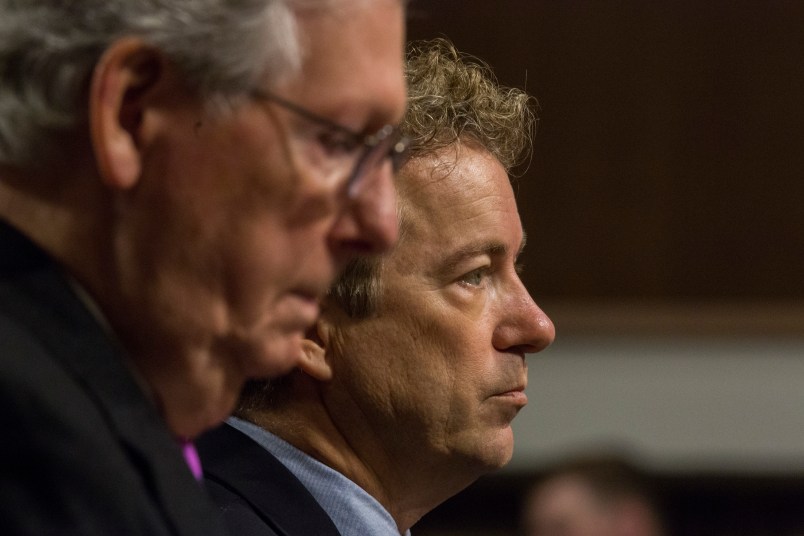Sen. Rand Paul (R-KY) didn’t mince words about the Senate GOP’s Obamacare repeal bill, which is slated for a vote later this week.
“It’s a terrible bill,” he told reporters Monday evening at the Capitol.
Paul under questioning then went further, saying he would not vote for the bill itself or on the procedural motion to proceed, threatening to kill the bill before its gets a floor vote. Due to Republicans’ narrow majority in the Senate, the GOP can only lose two votes.
Paul’s remarks came shortly after a CBO report showed the Senate bill would drive up out-of-pockets costs for consumers even as it knocked 22 million off coverage by 2026.
Paul, who has been loudly skeptical of the GOP’s effort to repeal Obamacare, argued that it doesn’t go far enough. “Republicans were elected to repeal Obamacare, not to keep Obamacare,” he said.
Paul insisted that Republicans will be better off politically in next year’s midterm elections if they pass no bill at all rather than pass one that doesn’t completely repeal Obamacare and leaves the GOP owning a “broken” health care system.
“We’re not doing anything to fix the problem,” he said. “And I think there’s actually more blame to be attached to not doing a real thorough fixing than there is to doing nothing.”
Paul was one of a handful of senators Monday night to announce an intent to vote no on a motion to proceed this week—the precursor to a vote on the bill itself. Together with Sen. Susan Collins (R-ME), Sen. Dean Heller (R-NV) and Sen. Ron Johnson (R-WI), the mini-revolt could stop the bill in its tracks.
But most lawmakers, even those who have been vocally critical of the bill, were much more cagey—telling reporters either that they needed more time to study the CBO report, or needed to talk to their governor. Some avoided reporters’ questions altogether by pretending to take a phone call while others speed-walked into the nearest senators-only elevator.
Sen. Shelley Moore Capito (R-WV) noted that “the Medicaid portion is obviously the area of greatest concern for me,” but refused to answer how she would vote later this week.
Sen. Ted Cruz (R-TX) similarly declined to answer how he would vote on a motion to proceed, saying only: “At this point, we need to do considerably more to lower premiums. Significant work remains to be done.” The CBO analysis found that premiums would initially rise by 20 percent under the Senate GOP bill, and while they would decrease over time, deductibles and other costs would skyrocket.
Sen. John McCain (R-AZ), whose constituents would be hit particularly hard by the gutting of the Medicaid expansion, refused to comment until he spoke to Gov. Doug Ducey (R). “I’ll see what he wants.” Pressed further, he snapped at TPM: “I’m not going to talk to you about the status of my conversations with the governor of my state. I’m sorry.”
Yet while these senators appeared stressed and sobered by the prospect of the looming vote that could decide their political futures and that of the nation’s health care system, others were more sanguine.
“Look, we still have a long ways to go on this process,” a smiling Sen. Corey Gardner (R-CO) told reporters, despite the fact that Republicans are preparing to vote in just a few days.
Sen. Jim Inhofe (R-OK), asked if the bill would too severely cut Medicaid, replied calmly: “I’m not sure what it does. I just know that it’s better than Obamacare. That’s the question we should really be talking about.” Asked why the bill is better than Obamacare, Inhofe appeared flustered as he made his way to an elevator in the Capitol’s basement. “Well, if you want to go back and discuss Obamacare, that would be another issue.”







So… it is terrible because it does not completely repeal the ACA right away? Nothing at all to do with the CBO report, so he is only repeating his position as of yesterday. Is that right?
Sounds like someone’s trying to cover the GOP on both the right (“It doesn’t go far enough!”) and the left (“We didn’t take away your insurance!”). Rand Paul’s not up for reelection until 2022, which may be why he’s today’s performance artist.
It must be tough for him to defer his dream of stealing Medicaid $ from the poor, elderly, and disabled:
Conscienceless, murderous scum.
I don’t suppose anyone was able to pin Rand down on what similarities this bill has to the ACA?
Like the CBO score was gonna affect his vote in the 1st place?
The Republican Senators cherry picking themselves via any media for ‘it wasn’t me’ and re-election purpose. Didn’t this exact same thing happen in the last big phonyfuck vote ? Visions of the Shrub fool me once gig.